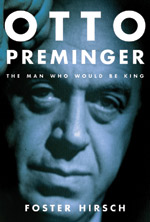(Knopf, 592 pages, $35)
By Foster Hirsch
 Otto Preminger, perhaps the most publicly recognizable director of the 1950s after Alfred Hitchcock, has seen his reputation decline drastically since his death in 1986. Today he’s often unfairly remembered more for his temper tantrums, his role as a Nazi POW camp commandant in Billy Wilder’s Stalag 17, or for his relationships with Gypsy Rose Lee, Dorothy Dandridge and Jean Seberg, than for enduring films such as Laura, Anatomy of a Murder and Carmen Jones.
Otto Preminger, perhaps the most publicly recognizable director of the 1950s after Alfred Hitchcock, has seen his reputation decline drastically since his death in 1986. Today he’s often unfairly remembered more for his temper tantrums, his role as a Nazi POW camp commandant in Billy Wilder’s Stalag 17, or for his relationships with Gypsy Rose Lee, Dorothy Dandridge and Jean Seberg, than for enduring films such as Laura, Anatomy of a Murder and Carmen Jones.
Moving beyond the one-dimensional stereotype, Foster Hirsch examines Preminger’s many flaws and contradictions in the first full-length biography of the director. Here was a man who had fled Austria with his socially prominent Jewish family, yet who was famed for playing Nazis; a man who directed Exodus, a film about the founding of a free Jewish state, who nonetheless often behaved like a dictator on the set. But this image of Otto the Terrible misses the many accomplishments of this pioneering producer/director, who, among other achievements, lit the long fuse that would later detonate the Production Code.
Preminger was a privileged young man in Vienna, the son of the country’s most successful Jewish jurist, and a law school grad himself before succumbing to the lure of theater. Later, theater and the law would define his career as he adapted numerous Broadway plays for the screen, often with a lawyer’s sense of how ambiguous the facts can appear. As Hirsch explains, Preminger’s signature style often involved standing back from the action onscreen by using long shots and hands-off editing to allow the audience to come to its own conclusions. We also get to see Otto the egomaniac, Otto the racially colorblind mentor to Dorothy Dandridge, and Otto the PR-savvy producer/director/showman. Hirsch, the author of numerous books including studies of Woody Allen, film noir, and the Actors Studio, mines archives and memoirs to persuasively make a case for the greatness of at least 10 of Preminger’s films, while noting also the terrible falling off that occurred after 1965 with projects as woefully misguided as Skidoo and Rosebud.
If ever a director warranted the “warts-and-all” biographical approach, it is Preminger. But Hirsh, like his subject, remains judiciously balanced throughout, providing at long last the three-dimensional, in-depth portrait this important filmmaker deserves. And for good measure, there is an epic, spittle-strewing tantrum every 20 pages.
Review written by John Patterson.